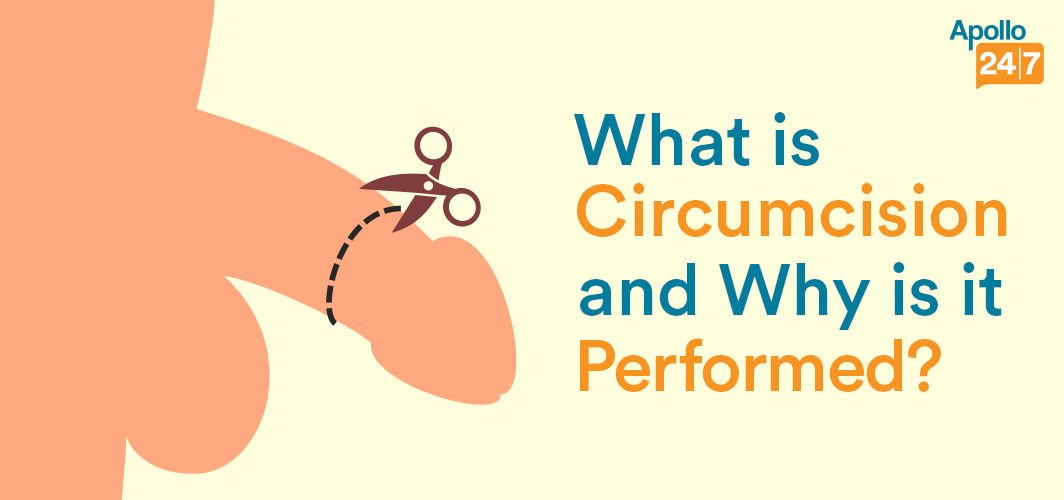General Health
What Is Circumcision And Its Benefits?
6 min read
By Apollo 24|7, Published on - 30 June 2022, Updated on - 17 March 2023
Share this article
0
23 likes

Circumcision surgery is one of the oldest surgical procedures performed to remove excess foreskin. It can be performed by an expert urologist, who specialises in diagnosing and treating diseases affecting urinary tract.
Foreskin is the sheath of skin covering the head of the penis or glans penis. At birth, foreskin is fully attached to the penis and over a time, it separates and can be retracted.
If foreskin is not retracted completely, it can lead to cause problems like phimosis [foreskin can't be pulled back or retracted], paraphimosis [foreskin becomes trapped behind the head of the penis or glans penis], balanitis [inflammation of the glans penis], and balanoposthitis [[inflammation of the foreskin and head of the penis].
Here, let's know more about circumcision like why it is performed, benefits associated with it, risks of undergoing circumcision, and most commonly asked questions about circumcision.
Why Is Circumcision Performed?
As said earlier, circumcision surgery is one of the oldest surgical procedures that is still performed in this modern-era. This surgery is performed as a part of religious rituals, medical purposes and cultural reasons. Generally, people who follow Islam, Judaism, Druze faith, and some Christian denominations are tend to get circumcised as a part of religious rituals.
But with the latest medical advancements, many males are aware of the medical benefits associated with circumcision surgery. Because of this, male individuals from different religions around the world are inclined to getting a circumcision surgery.
Here are some reasons why a circumcision is performed. Have a look at them and consult our best urologist near you to know in depth about the safest circumcision surgery.
- To remove excessive foreskin
- To treat, cure, and or prevent foreskin problems like phimosis, paraphimosis, posthitis, and balanoposthitis.
- To treat balanitis xerotica obliterans, preputial neoplasms, and other genital or penile problems in males.
- To treat frenulum tears.
- To reduce urinary tract infections.
- To maintain proper hygiene.
- To reduce or decrease the risk of sexually transmitted diseases [STDs].
If foreskin problems are not treated, they can make an individual to suffer from pain and discomfort while urination, penile discoloration, blood in the urine, etc. Medications, creams, ointments, and home remedies can provide a temporary relief for penile and foreskin diseases. But for permanent cure of foreskin diseases, circumcision is recommended by many doctors.
One of the surveys conducted by the WHO states “Almost 30% of adult males in the world are circumcised. About two-thirds of those males are Muslims. In India alone, approximately 13.5% of total males are circumcised.”
Benefits of Circumcision
Here are some major benefits of male circumcision. Do have a look at them and consult our best circumcision specialists near you to know in-dept about circumcision surgery.
- Enables proper penile hygiene
- Reduces the risk of HIV transmission in men
- Lowers the risk of penile cancer
- Prevents foreskin diseases
Circumcision surgery not only benefits males, but also their female partners. Here are some benefits of male circumcision to a women.
- Enhanced sexual pleasure
- Less chance of infections like
- Reduced risk of cervical cancer
- Long-lasting intimate moments
Not only these, there are many medical and non-medical benefits associated with a circumcision. We recommend you book your appointment with our best urologists and learn about it.
Care Tips To Follow After Circumcision
If you or your child underwent a circumcision surgery, it is necessary to follow post-surgical care tips as they can help to heal the surgical site quickly and boosts the recovery process.
- Gently clean the penile area with water every day.
- Use mild soap and water to clean the penis to avoid a burning sensation.
- Try not to take off the dressing or bandages from the surgical site on your own.
- Contact the doctor and seek immediate medical attention if swelling, irritation, and inflammation doesn't subside over time after the surgery.
- Avoid having sexual intercourse for a week or until the doctor says so.
It is always necessary to follow the suggested care tips to avoid the occurrence of any major risks, side-effects and complications from the circumcision. So, try not to skip the care tips directed by the doctor.
Risks of circumcision
If the circumcision is not performed by an expert surgeon, it can cause some risks and complications which can put an individual life at risk. Here are some risks associated with a circumcision surgery.
- Bleeding from the site of surgery [penile bleeding]
- Infection at the site of surgery
- Allergic reaction to the ingredient used in the anesthesia
- The foreskin might be cut too short or too long
- The foreskin might fail to heal properly
- The remaining foreskin might reattach to the end of the penis, requiring minor surgical repair
To avoid such risks, get circumcision surgery by an expert surgeon who is well-experienced in performing many successful circumcision surgeries.
Commonly Asked Questions About Circumcision
1. What is the best age for circumcision surgery?
For newly born children, circumcision is ideal at the age of 7 or 8 days. In a few instances, circumcision can be performed within a couple of days of birth. Adults can avail this surgery whenever they want to. Learn more about circumcision by consulting the best urologist near you.
2. Does circumcision increase the penile size?
No. Circumcision does not help in increasing the size of the penis. Removing a layer of penile skin [foreskin] doesn’t impact or change the penile tissues. Instead, circumcision reduces the chances of STDs infections, improves sexual satisfaction, and prevents foreskin diseases.
3. Does circumcision improve sexual performance?
Yes. According to some medical journals, circumcision can increase penile sensitivity and the time to ejaculation. Thus, it makes the male last longer during sexual intercourse and improves sexual performance.
4. How to tell if a guy is circumcised or not?
By the appearance of the penis, it is easy to tell whether the individual is circumcised or not. Uncircumcised males can retain the foreskin that covers the glans or head of the nonerect penis. Whereas, circumcised males expose the glans penis when the penis is erect and nonerect. This is because the foreskin is surgically removed and exposes the head of the penis.
Conclusion
One of the oldest surgical procedures practiced by many doctors in this modern-era is circumcision. It involves removal of the foreskin or sheath or hood covering the glans penis. Circumcision helps in preventing and curing foreskin problems like phimosis, paraphimosis, balanitis, and balanoposthitis. It not only benefits male individuals, but also their female partners. If circumcision is not performed by an expert surgeon, then it can lead to risks and complications which can put the individual life at risk. So, it is always advised to consult and undergo the circumcision by an experienced urologist.
General Health
Leave Comment
Recommended for you

General Health
Is A 5-Minute Walk Every 30 Minutes Good For Your Body?
Long hours of sitting can negatively affect our bodies in many ways. Even stretching or walking for 5 minutes every 30 minutes can counterbalance the ill effects of long hours of sitting.

General Health
Zero Calorie Sweeteners May Cause Heart Attack & Stroke!
Artificial sugar substitutes have now become a common way of reducing sugar and calorie intake. However, in recent research, it has been seen that people with heart diseases like diabetes are more likely to experience a heart attack if their blood has high concentrations of a sugar substitute popularly known as erythritol.

General Health
The Uses of Povidone-Iodine Ointment USP: A Comprehensive Guide
Learn about the various uses of povidone-iodine ointment USP and its effectiveness in preventing infections and treating skin conditions.
Subscribe
Sign up for our free Health Library Daily Newsletter
Get doctor-approved health tips, news, and more.
Visual Stories

Could There Be More to Your Snore?
Tap to continue exploring
Recommended for you

General Health
Is A 5-Minute Walk Every 30 Minutes Good For Your Body?
Long hours of sitting can negatively affect our bodies in many ways. Even stretching or walking for 5 minutes every 30 minutes can counterbalance the ill effects of long hours of sitting.

General Health
Zero Calorie Sweeteners May Cause Heart Attack & Stroke!
Artificial sugar substitutes have now become a common way of reducing sugar and calorie intake. However, in recent research, it has been seen that people with heart diseases like diabetes are more likely to experience a heart attack if their blood has high concentrations of a sugar substitute popularly known as erythritol.

General Health
The Uses of Povidone-Iodine Ointment USP: A Comprehensive Guide
Learn about the various uses of povidone-iodine ointment USP and its effectiveness in preventing infections and treating skin conditions.